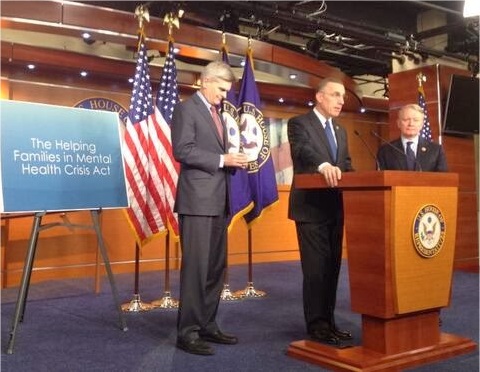Publisher's note: This post, by Lee Brett, was originally published in the Healthcare, Justice & Public Safety section(s) of Civitas's online edition.
A version of this op-ed appeared in the Charlotte Observer.
Last week, a young man from eastern North Carolina named Keith Vidal became the latest victim in a long series of preventable tragedies caused by untreated severe mental illness. Police shot and killed Keith, a
90-pound, 18-year-old boy who suffered from schizophrenia. It is a heartbreaking, but sadly familiar, story. Last month, Virginia state Sen. Creigh Deeds was stabbed by his mentally ill son, Gus, after the elder Deeds tried - unsuccessfully - to admit the 24-year-old man to a psychiatric hospital. There were no beds available. Gus Deeds critically wounded his father, and then took his own life. In a gut-wrenching tweet from the hospital, Creigh Deeds wrote: "I am alive so must live. Some wounds won't heal. Your prayers and your friendship are important to me."
The stories are endless: The Washington Navy Yard shooter. The Virginia Tech shooter. The Aurora movie theater shooter. The man who shot Congresswoman Gabrielle Giffords. All of these people suffered from untreated severe mental illnesses. But these are only the most visible faces of a national epidemic. Sensational headlines capture only a tiny portion of the suffering and harm caused by untreated severe mental illnesses. Divorce, child protective interventions, family violence, homelessness, incarceration, victimization, and drug use are just a few of the aftershocks that accompany psychiatric diseases like schizophrenia and bipolar disorder.
The failures of our system are well-known, yet poorly understood. Many people know that the mental health system is broken. But few people know exactly how or why. This causes a tendency to cry loudly for unspecific changes. "Something must be done!" the people thunder. And too often, politicians will do something for the sake of saying that they did something. Witness the President's recent announcement that the administration would release $100 million for "mental health services." More funding is good, but it must be targeted to have any beneficial effect. The White House plan, however, does not target any specific aspect of mental health. As a result, the proposal amounts to throwing money at the issue. It will be as ineffective as every other previous attempt to solve a complex and multi-faceted policy problem with funding alone.
But there are glimmers of hope. On both the state and national levels, there are opportunities to address the most urgent shortcomings of our mental health system. In North Carolina, the state Department of Health and Human Services (DHHS) has, at the direction of the governor, convened a "Crisis Solutions Initiative" to provide evidence-based innovations for the state mental health network. The Civitas Institute has cautiously applauded the effort, while strongly urging policymakers to increase the number of inpatient psychiatric beds and ensure the continuity of care for people with severe mental illnesses. In particular, Civitas has identified assisted outpatient treatment as a badly-needed safety net for mentally ill people who continually fall through the cracks of the mental health system.
Rep. Tim Murphy introducing the "Helping Families in Mental Health Crises Act"
On the national level, U.S. Rep. Tim Murphy (R-PA) has introduced the "Helping Families in Mental Health Crises Act." The bill, co-sponsored by U.S. Rep. Renee Ellmers (R-NC), stands in sharp contrast with the White House's response to mental health failures. Murphy's bill focuses federal attention on severe mental illnesses, not mental health in general. Instead of throwing money blindly at the issue, the bill targets assistance to the worst-off patients. It facilitates treatment by clearing a snarl of federal regulations that prevent a prompt and effective clinical response. For example, the bill would make it easier for providers to make psychiatric inpatient beds available in hospitals.
Murphy's bill also reforms the dysfunctional Substance Abuse and Mental Health Services Administration (SAMHSA). SAMHSA is a $3 billion component of the U.S. Department of Health and Human Services. It has come under repeated scrutiny for its bizarre and counterproductive views of mental illness. For example, a 2011 SAMHSA planning document made no mention of any serious mental illnesses such as schizophrenia, bipolar disorder, or schizoaffective disorder. In 2010, SAMHSA hosted speakers who described schizophrenia as a "spiritual experience" and "mad gifts to be nurtured and cultivated." E. Fuller Torrey, one of the nation's foremost critics of SAMHSA and an expert on schizophrenia, observed: "That the federal agency charged with reducing the impact of mental illness on America's communities is sponsoring forums at which severe mental illness is extolled as a good thing has overtones of Lewis Carroll."
The American mental health system has been stuck in the rabbit hole for far too long. But right now, there is a pivotal opportunity to change things for the better. The state DHHS, working with the legislature, can institute clinically-proven reforms that address the fragmentation and inadequacy of the state system. And in Congress, North Carolina representatives and senators can attack the issue by giving careful consideration to badly-needed, prudent legislation.
Preventable tragedies are all the more tragic precisely because they are preventable. On the state level and on the national stage, the Tar Heel State must act.


























